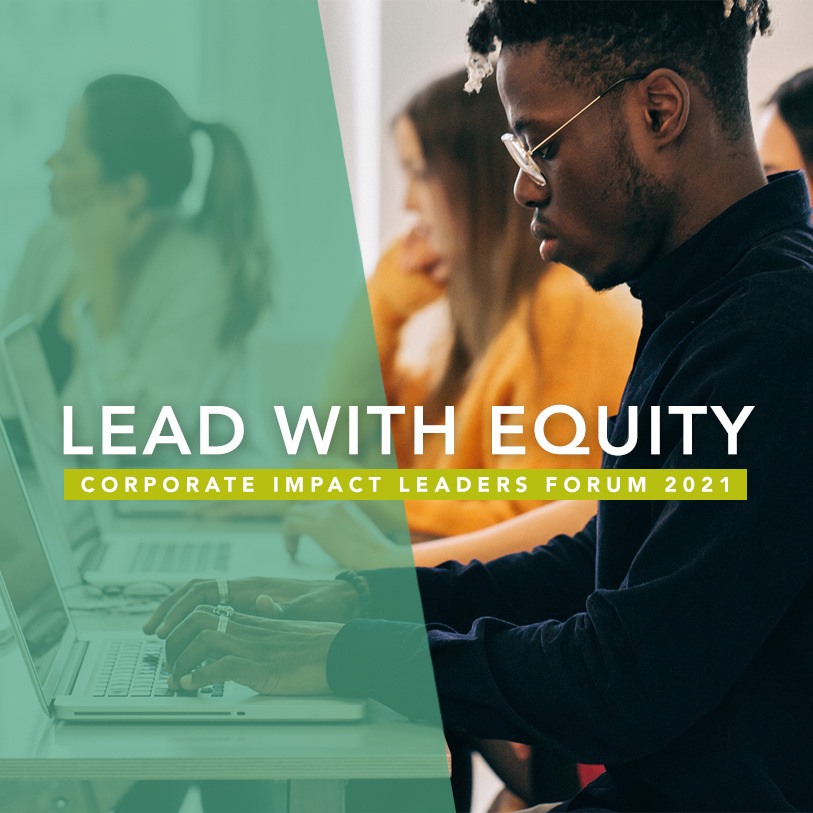
Healthy Individuals & Communities

Since we first launched the Tides Corporate Impact Leaders Forum (CILF) four years ago, our goal has remained constant: to create a space for social impact practitioners to engage in important conversations that will accelerate the pace of social change.
Today, more than 18 months into the pandemic and at a time of ongoing uncertainties and entrenched social challenges—from the devastation of the climate crisis to the plight in Afghanistan—a stronger sense of community has never felt more critical. That’s why we are especially excited to launch our 2021 Corporate Impact Leaders Forum series in partnership with Pledge 1%.
Corporate Social Impact (CSI) continues to evolve to meet the increasing demand for resources and innovation that address the world’s concerns and challenges. Consumers have changed their expectations, writes Future 500’s Erik Wohlgemuth in their 2021 Force for Good Forecast: “[They are] demanding corporate action that many CEOs couldn’t have imagined, even a year ago.”

In 2020, our first-ever all-virtual CILF convening gave us the opportunity to significantly expand access to our powerful community and speak into these challenges more broadly. This shift resulted in a more inclusive event with a greater number of corporate leaders coming together to advance social change through people, platform, and profit.
We look forward to building on that community this year through another series of robust conversations with all of you. Narrowing down topics for this year’s CILF was a tough task; there was no shortage of ideas given the year we’ve had. While we landed on three wide-ranging topics—championing equity and justice, the digital divide, and impact evaluation—equity was the theme that ran through all of them, because at Tides, we firmly believe that equity must be the lens through which we examine all business imperatives and social impact.
Corporations of all sizes set ambitious and necessary goals in the summer of 2020, promising more than $50 billion toward racial equity and justice. While we’re encouraged by this unprecedented level of commitment from the private sector, the actual deployment of resources has been lagging. This past May, for example, on the anniversary of George Floyd’s death at the hands of police, one analysis found just $250 million spent or pledged to specific initiatives.
A poll taken in June 2021 painted an even more sobering picture. It revealed a startling number of white C-suite executives surveyed—at least 51 percent—who considered diversity, equity, and inclusion (DEI) efforts as “a distraction from our company’s real work.”
Each company must grapple with what advancing equity and achieving justice actually means for their organization(s). In our kick-off panel, we’ll hear from corporate executives about where they are in their journey and about impactful, authentic approaches they believe can help shape the broader conversation. Panelists will discuss why those values are important to their companies and where they are in their own journey. They will also share strategies for engaging both internal and external stakeholders to ensure that the effort is authentic and impactful.
The events of the past year have demonstrated how crucial access to technology is for the health and economic stability of both individuals and communities. Making a digital economy work for all is a social justice imperative—not only for tech companies, but for every company. In this panel, we’ll discuss how corporate leaders are leading the charge to ensure digital economies reach all communities.
The fact that so many in our society are cut off from vital information and resources “compounds other inequities and historical injustices,” writes Bhaskar Chakravorti, Dean of Global Business at Tufts University’s The Fletcher School in a recent Harvard Business Review article.
And this disparity goes far beyond Internet access. Tufts researchers identified four distinct areas of the digital divide: there is infrastructure, in the form of broadband and smartphone access—what we typically think of as “connectivity,” but equally important are inclusivity (including affordability and equity of access), institutions, and digital proficiency.
The diverse, dynamic workforce we need will require corporate action in each of these areas—and, in some cases, on multiple fronts. Tides sees incredible opportunity here, which is reflected in examples of innovation among our own social ventures. Next Chapter, for example—a project founded by Slack in 2016 and that now enjoys support from other companies, including Dropbox and Zoom—builds pathways to tech careers for those who were formerly incarcerated and re-entering the workplace through apprenticeship. This is just one example of vital work that we hope to see continue to develop and grow in the months and years ahead.
Recent crises have prompted many funders to move to a more trust-based philanthropy model: funding organizations based on their needs and listening to their grantees, rather than imposing parameters that might add unnecessary burden. This hopeful shift requires rethinking impact measurement entirely—whether you are just starting out or working toward a more strategic grant-making approach.
Through data, we can gain a deeper understanding of our work and the people and stories behind the numbers. We can make smarter decisions and improve outcomes. As we communicate both our needs and successes more effectively, we can shift our relationships from transactional to transformational.
Initiatives such as Impact Genome, which will be featured in this panel discussion, represent the innovative ways that CSI leaders can both contribute to—and benefit from—our collective knowledge. We will hear from founder Jason Saul, among other experts in social outcomes measurement and data ethics, about the value of defining and driving meaningful impact.
In our final panel at CILF this year, we’ll discuss what new and effective evaluation approaches and tools can meet this growing trend of grantmaking built on trust—and the challenges that arise from it. And, equally important, how we embed equity into the evaluation process.
Join us at this year’s CILF to learn more about the session topics described above and to connect with others in the CSI community around how you can support your company’s journey on the path to an unwavering commitment to equity and social justice.

Healthy Individuals & Communities

Our Community

Philanthropy

Read the stories and hear the voices of social change leaders fighting for justice.